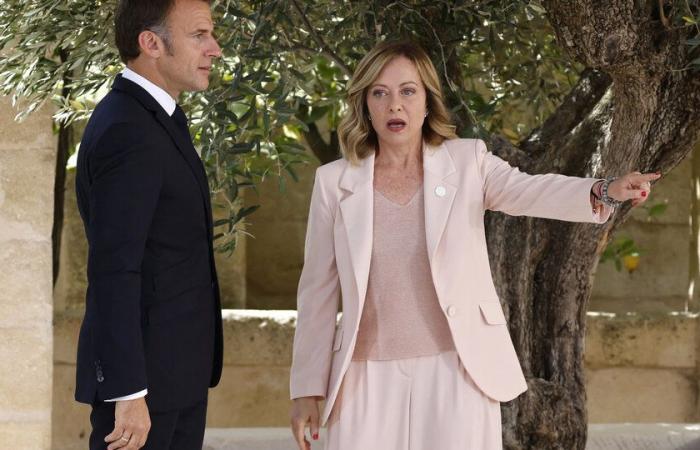
From Rome
Discussions and differences until the last minute characterized the almost three days of debate and the preparation of the G7 final document, the group of seven countries considered among the most industrialized in the world (Italy, Germany, France, the United Kingdom, Canada, the United States and Japan) that met from June 13 to 15 in the Italian region of Apulia (southeast of the country ). An issue on which there were differences was the abortion that the Italian prime minister, Giorgia Melonia right-wing and Catholic person in charge of the G7 this year, did not want to be named specifically in the final declaration.
In any case, the 36-page document It was approved by all G7 members.
The text condemns violations of the rights of women and homosexualsexpressing great concern about the reduction of these rights around the world, particularly in times of crisis, reaffirming the commitment to gender equality.
Although abortion has been legal in Italy since 1978, Meloni nevertheless said his government reiterates the commitments expressed in last year’s Hiroshima G7 final communiqué on this issue. The current document says that the G7 commits to “continue to promote comprehensive sexual and reproductive health and rights for all, and to promote maternal, neonatal, child and adolescent health, especially for those in vulnerable circumstances,” but does not mention the word “abortion”. For the G7 members, the reference to abortion was explicit in the final communiqué of the meeting in Japan last year. The French president Emmanuel Macron It was one of what he discussed the most with Meloni on this point. According to some interpretations, Meloni would have deleted the word “abortion” apparently so as not to offend Pope Francis who was present at the G7 and is obviously against abortion. But the Pope was not supposed to sign and it is not part of the final declaration.
“The abortion thing is a whole invented controversy that never became evident at the top of the G7 leaders,” Meloni said on Saturday at the press conference concluding the event. He also clarified that “the Italian government has not taken any step back on gay rights” as some attributed to it.
Progressive sectors, such as the Italian Nicola Fratoianni of the Green-Left Alliance, harshly criticized Meloni. “To eradicate hunger in the world it would be enough to reduce G7 military spending by 3%. Or increase taxes by 2% on the exclusive club of the richest in the world, who number around three thousand. I repeat three thousand, billionaires. These are the surprising data reported by Oxfam (Oxford Hunger Relief Committee) and Brazilian President Lula. If common sense and humanity ruled the world, the decision would have been obvious,” he wrote on Facebook.
The wars
Two other points were important in the meetings and highlighted in the G7 final document: the wars in Ukraine and Gaza. Regarding the war in Ukraine, the text specifically said that the G7 “supports Ukraine’s fight for freedom and its reconstruction, for as long as necessary.” In the presence of the Ukrainian president Volodymyr Zelensky, it was decided to make about 50 billion dollars available to them, taking advantage of Russian financial funds blocked in several countries around the world. “Russia must end its illegal war of aggression and pay for the damage it has caused to Ukraine. These damages currently exceed $486 billion, according to the World Bank (…) “Russia’s obligations, under international law, to pay for the damage it is causing, are clear” and possible legal avenues are being considered for make him comply with that, the text indicated.
And regarding the eventuality of the use of nuclear weapons he added: “Any use of nuclear weapons by Russia in the context of its war of aggression against Ukraine would be inadmissible. We therefore condemn in the strongest possible terms Russia’s irresponsible and threatening nuclear rhetoricas well as its strategic intimidation by announcing the deployment of nuclear weapons in Belarus.”
The G7 will help Ukraine to regain its energy stability and energy-related infrastructure and also to recover its agricultural activity. “Our ultimate goal is a just, lasting and comprehensive peace, in line with international law, the UN Charter and its principles, which respects the sovereignty and territorial integrity of Ukraine,” he said.
Iran and Gaza
In this context, Iran was also discussed, asking it to stop supporting the Russian-Ukrainian war and not to transfer any more ballistic missiles or technology to Moscow. They also called on him to cease his destabilizing actions in the Middle East and warned of possible new sanctions against them.
Regarding the conflict in Gaza, they called for an immediate ceasefire, the release of all hostages and a credible path to peace leading to a democratic two-state solution. It also called for a significant and sustained increase in humanitarian assistance and reiterated its condemnation of the Hamas terrorist attack of October 7 of 2023 that began the harsh Israel-Palestine conflict. But the document also condemned “the increase in violence against Palestinians, which weakens security and stability in the West Bank and threatens the prospects for lasting peace”.
The migrations
It is the first time that the G7 takes migrants into account, even though the Meloni government, and especially the Minister of the Interior and Vice Premier, Matteo Salvini of La Liga, are terribly anti-migrants, and have even made agreements with other countries such as Albania, so that migrants who try to reach Italy through the Mediterranean are referred there.
According to Italy, it is necessary for the G7 to be an international spokesperson for a new strategy, which is developed along different paths, starting from the fight against human traffickers who feed the flows of illegal immigrants and represent a new form of slavery. . “We launch the G7 Coalition to prevent and combat migrant smuggling”, said the text, recognizing that migration is a global problem, exacerbated by climate change. He also proposed cooperation agreements with the countries of origin and transit of migrants to contain trafficking, measures to strengthen borders and the creation of safe routes for legal migration. At Friday’s press conference Meloni said that the Interior Ministers had already been instructed to immediately initiate an effective anti-smuggling and anti-illegal migrants plan.
The text also indicated that it is necessary to strengthen global food security, for which different initiatives were discussed in Apulia. But it is also necessary to combat the triple crisis caused by climate change, pollution and the loss of biodiversity.
Some Latin American countries were mentioned in the list of countries to which the G7 paid the most attention due to their complicated situation. Among them Haiti, where the G7 will work with other countries to try to improve security. “It is imperative that the violence of military gangs be stopped”the text underlined.
About Venezuela the G7 said it was “very concerned about the political, economic and humanitarian crisis” that the country is going through. “We call on Venezuela to fully implement the Barbados Agreement and guarantee competitive and inclusive elections on July 28” that include international electoral observation missions. “We also demand an end to the harassment of opposition members and the immediate release of all political prisoners.”
Libya, Sahel, Sudan and Belarus were also included in the list of countries and regions in conflict that must be paid attention to.
Artificial intelligence and weapons
And keeping in mind the risks that the world runs if artificial intelligence grows without control, for which they were perfectly warned on Friday by Pope Francis who spoke precisely about artificial intelligence at the main meeting of the G7, the text indicated that it is important “Deepen our cooperation to harness the benefits and manage the risks of Artificial Intelligence (AI). “We will launch an action plan on the use of AI in the world of work.” Work will also be done to ensure that AI enables greater productivity, quality jobs and decent work.
The document recognized “the impact that AI can have in the military sphere and the need for a framework for its development and responsible use” and therefore encouraged more States to ensure that military use of AI is responsible and complies with the applicable international law, in particular international humanitarian law, and improve international security.”
Although Many of the G7 members are among the world’s leading arms producers. (the United States and France first but also the United Kingdom, Germany and Italy), the final document noted: “We remain firmly committed to preventing the proliferation and use of all weapons of mass destruction and their delivery systems.” and “We reiterate our commitment to the G7-led Global Partnership against the Spread of Weapons and Materials of Mass Destruction, a force driven to prevent, detect and respond to the acquisition and use of weapons of mass destruction by States and terrorists ”.





